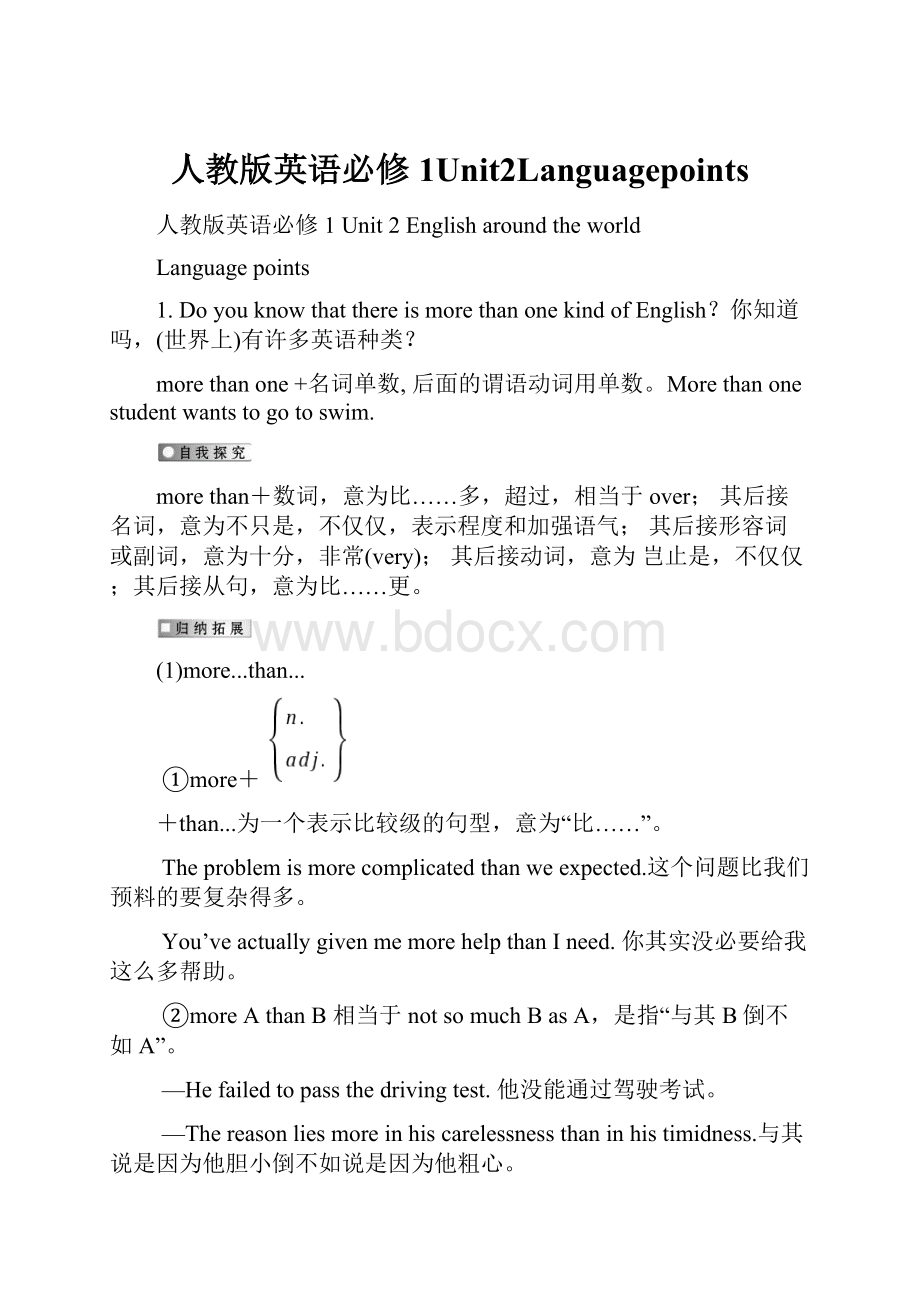 人教版英语必修1Unit2Languagepoints.docx
人教版英语必修1Unit2Languagepoints.docx
- 文档编号:25199503
- 上传时间:2023-06-06
- 格式:DOCX
- 页数:18
- 大小:67.17KB
人教版英语必修1Unit2Languagepoints.docx
《人教版英语必修1Unit2Languagepoints.docx》由会员分享,可在线阅读,更多相关《人教版英语必修1Unit2Languagepoints.docx(18页珍藏版)》请在冰豆网上搜索。

人教版英语必修1Unit2Languagepoints
人教版英语必修1Unit2Englisharoundtheworld
Languagepoints
1.DoyouknowthatthereismorethanonekindofEnglish?
你知道吗,(世界上)有许多英语种类?
morethanone+名词单数,后面的谓语动词用单数。
Morethanonestudentwantstogotoswim.
morethan+数词,意为比……多,超过,相当于over;其后接名词,意为不只是,不仅仅,表示程度和加强语气;其后接形容词或副词,意为十分,非常(very);其后接动词,意为岂止是,不仅仅;其后接从句,意为比……更。
(1)more...than...
①more+
+than...为一个表示比较级的句型,意为“比……”。
Theproblemismorecomplicatedthanweexpected.这个问题比我们预料的要复杂得多。
You’veactuallygivenmemorehelpthanIneed.你其实没必要给我这么多帮助。
②moreAthanB相当于notsomuchBasA,是指“与其B倒不如A”。
—Hefailedtopassthedrivingtest.他没能通过驾驶考试。
—Thereasonliesmoreinhiscarelessnessthaninhistimidness.与其说是因为他胆小倒不如说是因为他粗心。
(2)notmorethan意思是“至多,不超过”,它相当于at(the)most。
He’sonlyachildofnotmorethan10.他仅仅是个不到10岁的孩子。
(3)nomore(...)than...
①nomorethan后面常接数词,表示数量少,相当于only,意为“仅仅,只有”。
Tomysurprise,nomorethan5memberssharedmyidea.令我吃惊的是,只有5个人同意我的观点。
②nomore(...)than...意为“和……一样都不……”,表示对前后两方面均否定。
Don’taskhimaboutit.Heknowsnomorethanyou.别问他这件事了。
他和你一样对此一无所知。
用morethan/nomorethan/more...than/not...morethan完成下列句子
(1)—Doyouneedanyhelp,Lucy?
—Yes.ThisjobisIcoulddomyself.
(2)—Mysonisalittleslowinstudyingmaths.
—He’slazyslow.Heseldomdoesanyexercises.
(3)WhenIfirstbegantowork,youknow,Icouldearn50dollarseverymonth.
(4)I’llgiveyouIcanspare.
2....peoplefromEnglandmadevoyagestoconquerotherparts...英国人航海去征服其他区
域……
voyage,名词,常构成短语make或takeavoyage/voyages,onvoyage意为在航海中。
voyage,journey,travel,tour,trip
(1)voyage主要指“乘船作水上旅行”,也可指“空中旅行”。
(2)journey应用范围很广,指“有预定地点的陆上、水上或空中的单程长、短途旅行”,一般来说,它着重指“长距离的陆上旅行”。
(3)travel(n.)习惯用复数形式。
泛指旅行各地,表示旅行的路途远,时间长。
此外,travel还可以作动词用。
(4)tour指“以游览、视察、购物等为目的的旅行”,常含有“最后回到原出发点”的意思。
(5)trip为一般用语,指“任何方式的、从事业务或游览的旅行”,往往着重于“短途旅行”,在口语中,可与journey互换。
ⅰ用上面所提供的辨析词的适当形式填空
1).Itistiringtotakealong_______bytrainfromParistoMoscow.
2).The_________fromEnglandtoAustraliausedtotakeseveralmonths.
3).We’llhavetimefora______toFrancenextweekend.
4).Wewentonaguided______roundthecastle.
ⅱ根据中文意思填空
(1)他决定乘飞机去纽约旅行。
HedecidedtomakeatoNewYorkbyair.
(2)在航行中他晕船了。
Hegotseasick.
(3)他要周游全球。
Heisgoingtomakearoundtheworld.
(4)《马可·波罗游记》是我读过的最有意思的书。
TheofMarcoPoloisoneofthemostinterestingbooksthatIhaveeverread.
(5)因为暴风雪,旅行取消了。
Thiswascancelledbecauseofthesnowstorm.
3....andbecauseofthat,Englishbegantobespokeninmanyothercountries.……因为那一
点,许多国家开始说英语。
becauseof因为;由于是介词短语,后跟名词、代词或动名词及what从句。
becauseof属介词短语,后跟名词;because是连词,后跟句子。
Shegothurtbecauseofwhatyou’dsaid.她因为你的话而受到伤害。
【拓展延伸】because,as,since,for都表示原因,但意义不同
because直接原因,语气最强。
回答why提出的问题只能用because。
在强调句型中,也只能用because。
as用于解释做某事的原因,语气较弱,通常位于主句前。
since表示的原因是指众所周知的事实,意思“既然”。
语气比because弱。
通常位于主句前,并常与as换用
for并列连词,连接并列分句,表示一种补充说明,是推测或判断的理由,语气较弱
Because接从句,becauseof接名词,代词,动名词
单项填空
①Theopenairpartyhasbeenputoffthebadweather.
A.becauseofB.becauseC.insteadofD.instead
②Peoplecrowdedontheroadandcouldnotgoforwardthetrafficaccidentsomecarshadmade.(2010·山西太原五中检测)
A.withB.sinceC.becauseofD.because
4.Yes,I’dliketocomeuptoyourapartment.好啊,我想去你住的地方。
comeup,动词短语,无被动语态,意为走近;上来;发芽;流行;发生;被提出;上
升。
Hecameupandintroducedhimself.他走上前来并作了自我介绍。
Thedivercameuptothesurfacetohaveadeepbreath.潜水员浮到水面深吸了一口气。
TheseedsIsowedlastweekhaven’tcomeupyet.上星期我播下的种子还没有发芽呢。
Whendidtheseidiomscomeup?
这些习语是什么时候开始流行的?
I’llletyouknowifanythingcomesup.如果发生什么事的话,我会让你知道的。
Thequestionhasn’tcomeupyet.这个问题还没有被提出来。
Thepriceiscomingupalltheway.价格一直在上涨。
cometrue变成现实,成为现实comeupwith想出
comeover(从远处)来到;横过comeintouse开始使用
howcome...?
(表示理解)……怎么回事?
whenitcomestosth.当涉及某事时
HowcomeherFrenchissobadifshespent5yearsinpairs?
她在巴黎待了5年,但她的法语怎么这么糟糕。
Whenitcomestogettingthingsdone,heisuseless.一涉及到做事,他便不中用了。
(1)单项填空
Theyaren’tafraidwhentheythedifficultiesintheirstudy.
A.comeupB.cometoC.comeaboutD.comeout
(2)用come构成的短语填空
①Thehunterwalkedacrosstheforestwhensuddenlyabearhim.
②Themagazineonceamonth.
③IwishyoucantoEnglandonyourholiday.
④Theengineershavenewwaysofsavingenergy.
⑤Theyanoldschoolfriendinthestreetthismorning.
⑥Thepriceofoilis,makingtheconsumershappy.
⑦Howdidthewar?
⑧Alltheclothes$1,000.
5.ItwasbasedmoreonGermanthan...当时的英语更多的是以德语为基础的,而不是……
Theybasedthereportonfacts.这篇新闻报道完全是以事实为依据的。
Wecampedatthebaseofthemountain.我们在山脚下安营。
KarlMarxmadeLondonthebaseforhisrevolutionarywork.卡尔·马克思把伦敦作为他的革命根据地。
base,作动词时意为以……为基础,常见结构是base...on/upon...或bebasedon/upon...;作名词时,意为基础;基部;基地。
ⅰ用base相关用法填空
(1)这部电影是以鲁迅的小说为蓝本的。
ThefilmanovelbyLuXun.
(2)容器的底部有个洞。
Thereisaholeintheofthecontainer.
(3)那个公司的办事处遍布全世界,但总部在巴黎。
Thatcompanyhasofficesallovertheworld,buttheirisinParis.
ⅱ[即学即练]翻译下列句子。
1.这出戏以真事为基础。
2.我很多时间在英国度过,但主要还是住在中国。
6....theEnglishwespeakatpresent.我们目前所说的英语……
Wehaven’tfoundthethiefatpresent.目前我们还没抓到这个贼。
atpresent意为现在;目前。
=atthepresenttime
present
①thepresentgovernment现政府②Allthepeoplewhowerepresentatthemeetingwerefortheplan.出席会议的人都赞同这个计划。
③Allthestudentspresentareagainsthisadvice.所有在座的学生都反对他的建议。
④Allthepresentsshouldbepresentedtoeachstudentspresentatthepresenttime.这些礼物应当送给目前在场的每一位学生。
用present相关用法填空
(1)Idon’tplantogoonholiday(目前).
(2)大部分到场的科学家表达了他们对当前国家形势的看法。
Mostofthescientistsexpressedtheirideasaboutthe.
7.Shakespearewasabletomakeuseofawidervocabularythaneverbefore.莎士比亚所用的词汇量比任何时候都大。
YoumustmakegooduseofeveryopportunitytopractiseEnglish.
你必须好好利用每一个机会练习英语。
TheInternetresourcesshouldbemadefulluseof.网络资源应当得到充分利用。
makeuseof意为利用;makegooduseof意为好好利用……;makefulluseof意为充分利用……,其中use是不可数名词。
makethebestof充分利用,善用……makethemostof充分利用,尽量利用……
Youshouldmakethebest/mostofthisvaluableopportunity.你应该充分利用这宝贵的机会。
ⅰ单项填空
FulluseshouldbethetimetopractisespeakingmoreEnglish.
A.takenBmadeC.takenofD.madeof
ⅱ【即境活用】翻译下列句子。
1).要充分利用一切机会说英语。
2).我们要很好地发挥她的才能。
8.EnglishisalsospokeninSingaporeandMalaysiaandcountriesinAfricasuchasSouth
Africa.在新加坡,马来西亚和非洲一些国家如南非,人们也说英语。
①Ilikethosestudentswhoarecarefulwiththeirlessons,suchasMary,Lina.
我喜欢那些学习认真的学生,例如:
玛丽,琳娜。
②Englishisspokeninmanycountries,suchasAustraliaandCanada.许多国家都讲英语,例如澳大利亚和加拿大。
③Metalsaresuchthingsasironandsteel.金属是一些像铁、钢一样的东西。
suchas意为例如,用于列举前面所述情况,有时也可分开用,such后接名词或代词,as后接名词或定语从句修饰such后的成分。
forexample,suchas,thatis
(1)forexample用来举例说明某一论点或情况,一般只列举同类人或物中的“一个”为
例,作插入语,可位于句首、句中或句末。
Ballgames,forexample,havespreadaroundtheworld.
例如,球类运动已经在世界各地传播开了。
(2)suchas用来列举事物时,一般列举同类人和事物中的几个例子。
插在被列举的事物与前面的名词之间,as后面不用逗号。
(3)使用suchas短语时,后面列举的事物的数量不能等于它前面所提到的总和,一旦相等就要用thatis或namely。
Ihavethreegoodfriends,suchasJohn,JackandTom.(错)
Ihavethreegoodfriends;thatis,John,JackandTom.
我有三个好朋友,即约翰、杰克和汤姆。
ⅰ用thatis,suchas,forexample填空
(1)Heknowsthreelanguages,,Chinese,FrenchandEnglish.
(2)Whatwouldyoudoifyoumetawildanimal—alion,?
(3)Thefarmergrowsvariouskindsofcrops,wheat,corn,cottonandrice.
(4)Mattermaybeinvisible;air,,isthiskindofthematter.
ⅱ【即境活用】Theteacherpraisedhimveryoften,____heisagoodstudentinourclass.
A.suchasB.ForexampleC.such---asD.Thatis
9.TodaythenumberofpeoplelearningEnglishinChinaisincreasingrapidly.目前在中国,
学习英语的人数在迅速增长。
IndiahasaverylargenumberoffluentEnglishspeakers...印度拥有众多讲英语很流利的
人。
Anumberofcarsareinthestreet.大街上有许多车。
Thenumberofcarsinourcompanyisincreasing.我们公司的轿车数在增长。
thenumberof意为……的数量,作主语时谓语用单数;anumberof意为许多,作主语时,谓语用复数,该短语也可换为numbersof,number可被large、small、great、good来修饰。
只能修饰可数名词的:
alarge/great/goodnumberof,agood/greatmany,dozensof,scoresof,quiteafew
只能修饰不可数名词的:
agreatdealof,alargeamountof,quitealittle,alargesumof
既可修饰可数也可修饰不可数名词的:
plentyof,alotof,lotsof,alargequantityof
ⅰ单项填空
IknowofyourclassmatesarestudyingFrench;what’softhem?
A.thenumber;anumberB.anumber;thenumber
C.anumber;anumberD.thenumber;thenumber
ⅱ【即境活用】⑴用anumberof或thenumberof填空
①IhavebeentoBeijingtimes.
②peopleinjuredinthisaccidentwas14.
③hishouseisNO.16.
④thestudentsinourschoolhasrisenthisyear.
⑤visitorscametoourschooltoattendtheinternationaleducationconference.
⑵用所给动词的适当形式填空
①Agoodnumberofshoes(have)beensellingintheshoeshop.
②Thenumberofsmokers(be)rapidlyincreasingamongteenagers.
③There(be)alargenumberofrivershavebeenpolluted.
10.Onlytimewilltell.只能让时间来断定了。
ItisdifficulttotellLucyfromLily.很难分辨出Lucy和Lily。
Ican’ttellwhoiswrong.我分不清谁错了。
tell意为分辨,辨别,tellAfromB把A和B分辨清。
Heistooyoungtorightwrong.
A.know;fromB.say;fromC.tell;fromD.tell;of
11.CanyoufindthefollowingcommandandrequestfromReading?
你能从“Reading”里找到下面的命令或要求吗?
①Shereceivedthecommandthatsheshouldreturnsoon.她服从了命令,不久将会返回。
②Theteachermadearequestthatthestudentsshouldbewellpreparedfortheexams.
老师要求学生们对考试做充分的准备。
command,名词,意为命令;指挥;掌握;request,名词,意为请求,要求,这两个词后面跟从句时,从句的谓语动词都用“should+动词原形(should可省略)”。
request、command也可作动词用,其后从句的结构也是“should+动词原形(且should可省略)”。
requeststh.of/fromsb.向某人请求……requestsb.todosth.请求某人做某事
request+thatclause请求……
应某人的请求beinrequest有需要;受欢迎
incommandofsb.由……掌握着haveagoodcommandof...精通……
①Shemadearequestforhelp.她请求帮助她。
- 配套讲稿:
如PPT文件的首页显示word图标,表示该PPT已包含配套word讲稿。双击word图标可打开word文档。
- 特殊限制:
部分文档作品中含有的国旗、国徽等图片,仅作为作品整体效果示例展示,禁止商用。设计者仅对作品中独创性部分享有著作权。
- 关 键 词:
- 人教版 英语 必修 Unit2Languagepoints
 冰豆网所有资源均是用户自行上传分享,仅供网友学习交流,未经上传用户书面授权,请勿作他用。
冰豆网所有资源均是用户自行上传分享,仅供网友学习交流,未经上传用户书面授权,请勿作他用。


 《爱和自由》读书心得15篇.docx
《爱和自由》读书心得15篇.docx
